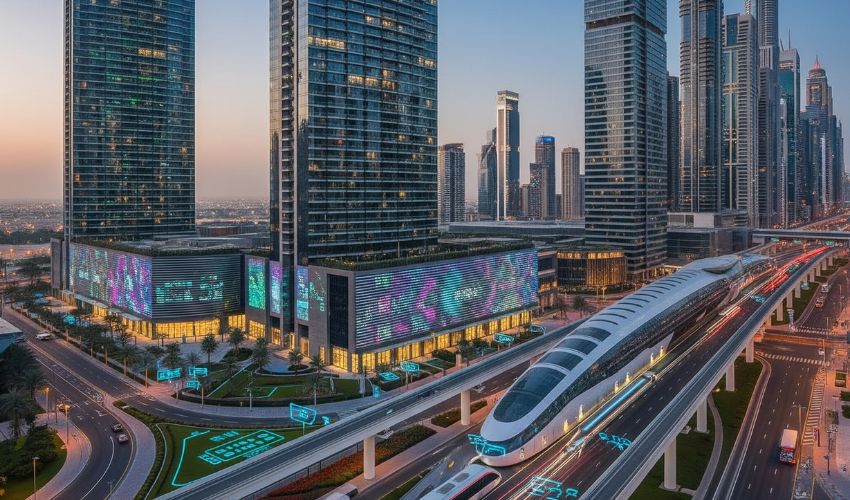In an era marked by global economic uncertainties, investors are seeking stable and resilient markets. Dubai’s real estate sector stands out as a beacon of stability and growth, with its property market demonstrating remarkable resilience even during challenging times. This strength is further underscored by the positive outlook for Dubai’s economy in 2025, as experts forecast continued expansion and investor confidence. Within the broader region, Dubai has established itself as a leader in the GCC and Middle East, setting benchmarks for innovation and economic diversification.
But what underpins this resilience? Let’s delve into the factors that make Dubai’s property market recession-proof. Dubai’s strategic location as a global gateway not only attracts international investors but also positions the city at the crossroads of major trade routes. Alongside Dubai, Abu Dhabi has emerged as a key financial and technological hub in the region, with both cities driving infrastructure investments, smart city development, and regional AI initiatives that contribute to the overall economic growth of the GCC.
Why Dubai?
Dubai has rapidly established itself as a premier destination for foreign investors, especially within the real estate sector. Thanks to its strategic location at the crossroads of Europe, Asia, and the Middle East, Dubai serves as a global gateway for trade and investment. The city’s forward-thinking urban planning and commitment to economic growth have made it a magnet for global investors seeking to diversify their portfolios and capitalize on non-oil GDP growth.
Even as the global economy faces mounting trade tensions and the looming threat of a global recession, Dubai’s real estate market remains well positioned to withstand these challenges. The World Bank has highlighted the negative impact that trade barriers and trade tensions can have on the global economy, yet Dubai’s economy has demonstrated remarkable resilience. This is largely due to the city’s focus on tourism, infrastructure development, and a business-friendly environment that continues to attract investors from Europe, Asia, and across the Middle East.
Dubai’s ability to adapt and thrive in a rapidly changing world underscores its status as a leading hub for real estate investments. For investors seeking stability, growth, and a dynamic market, Dubai stands out as a compelling choice.
Global Economic Context
The global economy is currently navigating a period of heightened uncertainty, driven in large part by the ongoing global trade war and rising trade barriers. These trade tensions have led to a decline in global trade volumes and increased the risk of a global recession. According to the World Bank, persistent trade disputes between major economies could reduce global GDP by half a percentage point in 2025, pushing the already fragile global economy closer to contraction.
Despite these global risks, Dubai’s real estate sector has proven to be a safe haven for investors. While many markets around the world are experiencing volatility and declining property values, Dubai continues to see a rise in rental prices and sustained demand for real estate. The UAE government’s proactive efforts to diversify the economy and reduce reliance on oil have played a critical role in maintaining economic stability and investor confidence.
Dubai’s strategic location, world-class infrastructure, and robust services sector have attracted a growing number of foreign investors and international companies. The city’s business-friendly environment and commitment to development have made it a preferred destination for those seeking to safeguard their investments against global market volatility. As the global economy faces ongoing challenges, Dubai’s real estate market remains a beacon of growth and stability, offering attractive opportunities for investors from around the world.
Macroeconomic Stability
Dubai’s economy has demonstrated remarkable stability, even amidst global downturns. Key indicators include:
1. Non-Oil GDP Growth: The UAE’s non-oil sectors, such as tourism, construction, and financial services, have been significant growth drivers. The IMF projects a 4% growth in non-oil GDP for 2025.
2. Controlled Inflation: Inflation rates have remained around 2%, showcasing effective monetary policies.
Recent statistics and data further support these economic trends, highlighting consistent growth and stable inflation rates over recent years.
These factors contribute to a robust economic environment, fostering investor confidence.
Government Support & Vision 2031
The UAE government has been proactive in implementing strategies to bolster economic growth:
1. National Investment Strategy 2031: Aims to double foreign direct investment (FDI) to AED 240 billion by 2031, enhancing the country’s appeal to global investors. The UAE is positioning itself as a leading country in the GCC for attracting foreign investment, setting a benchmark for other countries in the region.
2. Comprehensive Economic Partnership Agreements (CEPAs): These agreements with countries like India and China have facilitated trade and investment, further strengthening the economy.
Such initiatives underscore the government’s commitment to creating a conducive environment for real estate investment.
Diverse Buyer Base

Dubai’s real estate market attracts a global clientele:
International Investors: Buyers from Europe, Asia, and the Middle East are drawn to Dubai’s tax-free environment and high rental yields.
2. Expatriate Population: With a significant expatriate community, there’s a consistent demand for residential properties. Expats contribute money to the Dubai economy through property purchases and investments.
This diverse buyer base ensures sustained demand, mitigating risks associated with market volatility.
Smart City, Smart Returns

Dubai’s commitment to innovation and infrastructure development enhances its real estate appeal:
1. Smart City Initiatives: Projects like the Dubai Smart City aim to integrate technology into urban planning, improving efficiency and sustainability. Investing in technology and infrastructure is crucial to drive urban expansion and support long-term growth.
2. Infrastructure Development: Investments in transportation, healthcare, and education infrastructure boost property values and attract investors.
These advancements position Dubai as a forward-thinking city, offering long-term value to real estate investors.
Real-World Example: Sereno Residences in JVC

Sereno Residences, located in Jumeirah Village Circle (JVC), exemplifies the benefits of investing in Dubai’s resilient real estate market:
1. Strategic Location: JVC offers excellent connectivity to major business hubs and leisure destinations.
2. Modern Amenities: Sereno Residences features state-of-the-art facilities, catering to the lifestyle preferences of modern residents.
3. Investment Potential: With competitive pricing and high rental yields, properties in Sereno Residences are attractive to both investors and end-users. The Dubai market is highly competitive, with strong demand for quality developments—units are often sold quickly, and working with a company or broker can help secure a contract before properties are sold out.
Potential rental income and careful consideration of cost make Sereno Residences a financially attractive option for investors, offering untaxed rental income and strong returns.
This development showcases how strategic planning and quality construction can yield substantial returns, even during economic downturns. Businesses and companies are increasingly investing in developments like Sereno Residences to diversify their portfolios and capitalize on Dubai’s dynamic real estate sector.
For more information about sales, contracts, and investment opportunities, visit our website.
Conclusion
Dubai’s real estate market offers a unique combination of economic stability, government support, diverse demand, and innovative infrastructure. These factors collectively make it a recession-proof investment destination. For investors seeking long-term growth and security, Dubai stands out as a compelling choice.
FAQ
Q: Why is Dubai considered a recession-proof real estate market?
A: Dubai’s economic diversification, government initiatives, and global investor appeal contribute to its real estate market’s resilience.
Q: How does the UAE’s Vision 2031 impact real estate investment?
A: Vision 2031 aims to double FDI and enhance infrastructure, making the real estate sector more attractive to investors.
Q: What makes Sereno Residences a good investment?
A: Strategic location, modern amenities, and high rental yields make Sereno Residences in JVC a prime investment choice.
Q: Are there tax benefits to investing in Dubai real estate?
A: Yes, Dubai offers a tax-free environment with no property or capital gains taxes, enhancing investment returns.

